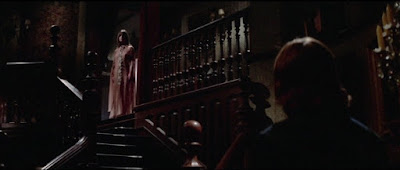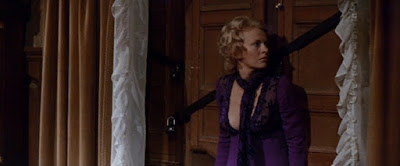The Corruption of Chris Miller is a 1973 Spanish giallo directed by Juan Antonio Bardem. It opens, fittingly, with a kind of prologue murder. We assume the woman is murdered by her lover whom she’s about to discard. We don’t see the murderer’s face.
Then we go to the main action which takes place in the rather palatial home of Ruth Miller (Jean Seberg), somewhere in the Spanish countryside. She lives with a young woman, her step-daughter Chris (Marisol). We soon find out that Chris is mad. She’s been under psychiatric care and she’s still very unstable.
Ruth doesn’t like men. She thinks they’re beasts. She does like women. We get the impression that she likes women as something other than just friends. Maybe she even likes Chris that way.
Then hitchhiker Barney Webster turns up while Chris is out riding. Barney thinks of himself as a bit of a stud. Ruth decides that maybe men can have their uses after all, at least in the bedroom. She makes it clear to him that she expects him to be gone before Chris gets home. But of course that doesn’t happen.
Barney doesn’t leave. He shares Ruth’s bed but he’s obviously pretty interested in Chris as well. The stage is clearly set for some emotional and sexual games.
Of course if you’re going to play such games it helps if you know the rules. It helps even more if you know who is making the rules. It’s particularly important if it’s the sort of game that has a designated victim and you don’t know you’ve been assigned to that rôle.
The answers to those questions are not at all clear. There are hints that could point to any one of the three being the designated victim. There are also hints that none of the three is entirely psychologically stable.
There’s Chris’s obsession with her father, and with rain. There’s Ruth’s obsession with locks. There’s Barney’s obsession with money and women but even more especially Barney’s obsession with Barney.
Much of the running time is taken up by the sexual game-playing. When the violence really erupts it does so in a fairly spectacular way.
Jean Seberg is terrific in this film. It’s a wonderfully ambiguous performance. In fact all three of the key performances are nicely and effectively ambiguous and the inter-relationships between the three characters are skilfully played out. All three characters have both sympathetic and unsympathetic moments. Perhaps the viewer won’t like any of them but we do want to figure out what motivates them. Actually we do, to some extent, know some of their motivations but we know just enough to make us even more uncertain how they’re going to react to those motivations.
This seems to have been Juan Antonio Bardem’s only foray into the giallo genre. He seems to have dabbled in most genres. He does a pretty assured job here. The pacing is perhaps a bit leisurely in the middle stages but that’s clearly a deliberate choice. He gives us some memorable visual moments. There’s that bizarre Charlie Chaplin-esque (yes really) opening murder, the truy operatic blood-drenched finale. And there are some oddly poignant moments.
Santiago Moncada’s screenplay is pleasingly twisted.
Vinegar Syndrome have done a fine job with this release. We get the movie on both DVD and Blu-Ray. There’s a tiny amount of print damage in the opening credits sequence but once the film gets going the Blu-Ray transfer is impeccable.
The language options present the sort of quandary that so many European genre films of this era present. Particularly with Italian films (and I assume it applies to many Spanish films as well) there’s often no original soundtrack as such - even the “original” language versions were post-dubbed. Vinegar Syndrome claim that the English language version is the original but they offer us the choice of the Spanish version as well. I watched the English language version and it’s quite satisfactory with none of the cringe-inducing qualities one sometimes encounters in English dubbed versions of European films.
They have also included an hour-long documentary on director Juan Antonio Bardem, a brief documentary on the tragic life and very up-and-down career of Jean Seberg plus they’ve given us the alternative ending of the Spanish version. Which raises other intriguing questions. In the case of most European genre films of this era there were different cuts for different markets and it’s often impossible to say which of them is the definitive cut. So you can choose the ending you prefer. I suspect most people will prefer the alternate ending. This is actually a movie that doesn’t end when you expect it to - it throws in some extra twists (how many depends on which ending you prefer).
The Corruption of Chris Miller has plenty of subtly creepy atmosphere. It has a clever literate script, three fascinatingly odd and complex central characters, psycho-sexual weirdness, fine acting and (for those who enjoy such things) plenty of blood. If Bardem was trying to prove he could do this sort of thing with as much style as the Italians then he succeeded. It really is a top-notch giallo. Highly recommended.





No comments:
Post a Comment